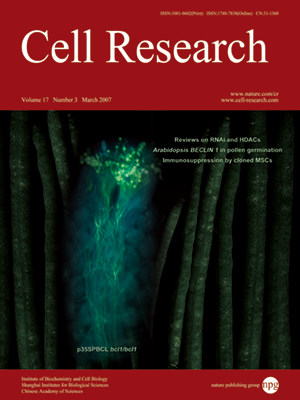
Volume 17, No 3, Mar 2007
ISSN: 1001-0602
EISSN: 1748-7838 2018
impact factor 17.848*
(Clarivate Analytics, 2019)
Volume 17 Issue 3, March 2007: 264-270
ORIGINAL ARTICLES
Downregulation of NFAT5 by RNA interference reduces monoclonal antibody productivity of hybridoma cells
Jihang Ju1,2, Ke Zou1,2, Hong Xie1
1Institute of Biochemistry and Cell Biology, Shanghai Institutes for Biological Sciences, Chinese Academy of Sciences, Shanghai
200031, China; 2Graduate School of the Chinese Academy of Sciences, Shanghai 200031, China
Correspondence: Hong Xie(hxie@sibs.ac.cn)
Hybridoma cells display an increase in antibody productivity following exposure to hypertonic conditions. However, the underlying mechanism is not well understood. In the present study, we hypothesize that the nuclear factor of activated T cells 5 (NFAT5)/tonicity enhancer binding protein (TonEBP) functions to increase the antibody productivity of hybridoma cells. NFAT5 is an osmosensitive mammalian transcription factor. However, its ubiquitous expression in various organs that are not bathed in hypertonic milieu suggests that NFAT5 may also regulate cell growth and function under isotonic conditions. In this study, we examined the expression of NFAT5 in hybridoma cells by Western blot analysis, and found that it increased significantly in hypertonic medium. To further define the function of NFAT5 in hybridoma cells, RNA interference technique was used to downregulate the expression of NFAT5 in SGB-8 cells (a hybridoma cell line). In isotonic medium, antibody productivity of hybridoma cells was reduced by downregulation of NFAT5 while cell proliferation was not influenced. The results presented here demonstrate that NFAT5 not only plays an important role in osmotic stress response pathway in hybridoma cells but also is essential for optimal antibody productivity.
Cell Research (2007) 17: 264-270. doi: 10.1038/cr.2007.3; published online 20 February 2007
FULL TEXT | PDF
Browse 1743


